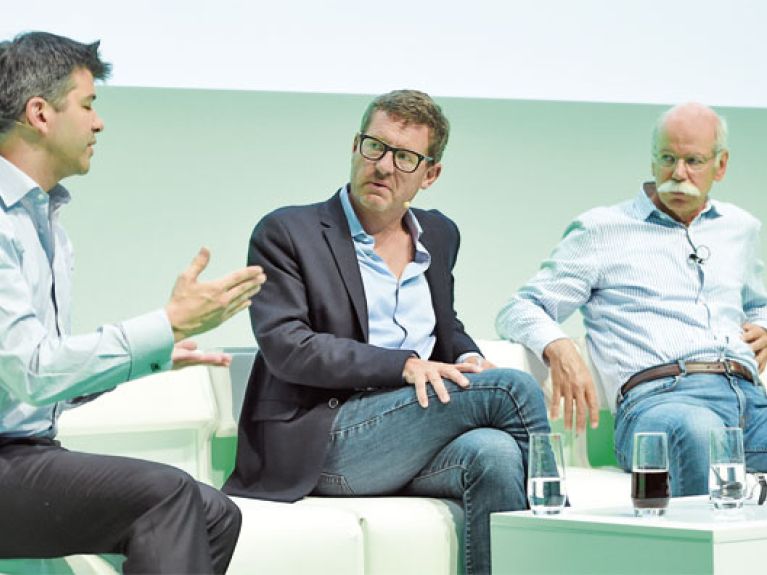Take it easy!
For many decades a strict dress code was maintained in the worlds of politics and business. Now, however, it is being revoked from on high. Not everyone is pleased.

Not so very long ago in Germany, a casual dress style was the privilege of modern business start-ups. Although many turned up their noses at the idea, young founders were allowed to get away without wearing suits and ties or matching jackets and skirts. They could even shockingly address everyone informally by their first name. However, anyone who wanted to radiate respectability in the world of business had to wear the appropriate elegant attire.
How times change! Daimler CEO Dieter Zetsche suddenly appeared in white sneakers on the red carpet at a charity gala, and then Lidl CEO Klaus Gehrig, lord over such a conservative Swabian company, announced that from now on he would like his employees to address him as “du”, using the informal and familiar second person singular pronoun. What is happening in Germany’s boardrooms? Clemens Graf von Hoyos, Chairman of the German Knigge Society and therefore the country’s supreme guardian of good manners, is observing a “new casualness”.
This new dress code has not appeared out of thin air. It is all about impressing people. Politicians use it to signal their dynamic and down-to-earth nature. Company bosses, on the other hand, are thinking about potential applicants: look here, they are saying, our firm is not at all as stuffy and hierarchical as people always think. The fact that business is moving in this direction has a lot to do with demographic change. The number of young people continues to fall, and good university graduates have long been able to pick and choose their employers. Unlike a few years ago, a well-known company name is no longer enough. Members of the freedom-loving Millennial Generation find it less attractive to join a traditional business corporation with all its departmental, divisional and sectoral managers and their associated reporting channels. By appearing in public in their shirt-sleeves, bosses are signalling: we may look old, but inside we are young and dynamic. When Daimler CEO Zetsche recently turned up at the Noah Internet Conference in Berlin wearing jeans and an open shirt, he did not do it without reason: he was scheduled to meet Travis Kalanick, the equally young and smart founder of the Uber transportation network start-up. This service does not only pose a serious threat to Daimler’s business model; it is meanwhile also worth almost as much as Germany’s premium car maker.
Zetsche is by no means an exception. Oliver Bäte, CEO of Allianz, the financial services group, recently appeared in front of shareholders in red sneakers, while not long ago Siemens boss Joe Kaeser publicly rescinded the old dress code. “Smart casual” is the new mantra of the business world. In a nutshell: clothes should be a little more stylish than at home, but the dividing lines between work and leisure are becoming blurred. For women, however, this only applies to a limited degree: while in the USA Yahoo CEO Marissa Mayer and Facebook COO Sheryl Sandberg turn up for meetings in figure-hugging dresses, female executives in Germany usually stay with their trouser suits. There’s not much room for experimentation when you want to be taken seriously.
This new casualness is also changing the general tone in many firms. First, Hans-Otto Schrader, CEO of Otto, offered his employees the familiar “du” form of address (those who wish to may even call him “Hos”). Then, Norbert Winkeljohann, PWC CEO in Germany, insisted staff call him “du” in future. And now Klaus Gehrig, CEO of the 375,000 people who work in branches of Lidl and Kaufland, is simply “Klaus”. That may be very friendly and make sense in international corporations where everyone communicates in English and uses first names, but not all employees appreciate this verbal intimacy. “Using the familiar ‘du’ does not prevent conflicts,” warns etiquette expert von Hoyos, “on the contrary, sometimes it actually creates them.” For example, when Klaus at Lidl says point blank: “People that don’t use ‘du’ isolate themselves. They are not the people we need.” ▪

